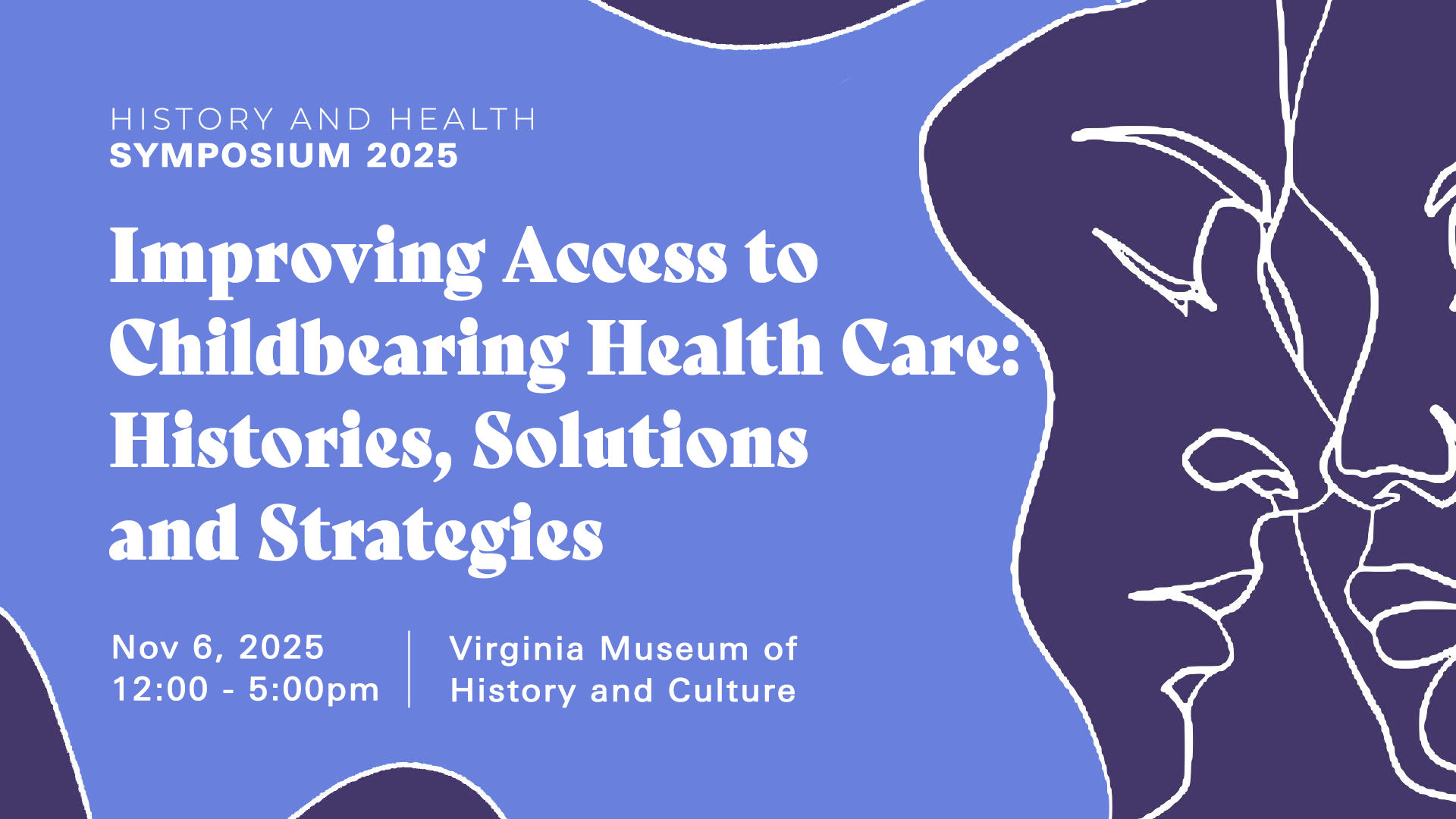
History and Health Symposium
“Improving Access to Childbearing Health Care: Histories, Solutions and Strategies"
The 2025 symposium will explore how access to childbearing care and resources is related to improving health outcomes and addressing health disparities.
Objectives: At the conclusion of the symposium, attendees should have gained increased awareness of:
- Strategies to improve access to childbearing health care in local communities, including rural areas
- Resources to support pregnant, postpartum and breastfeeding individuals
- State legislation, policies and programs that have been implemented in Virginia to address childbearing health care access
Details
12:00 - 5:00pm
November 6, 2025
Venue: Virginia Museum of History and Culture (428 N. Arthur Ashe Blvd, Richmond VA 23220)
This symposium is co-hosted by the Office of Health Initiatives and the Humanities Research Center.
Co-sponsored by the Institute for Women’s Health, the Department of Obstetrics and Gynecology, and the School of Dentistry at Virginia Commonwealth University.
This event is free & open to all.
Agenda
11:30 - 12:00 p.m.
Registration
12:00 – 12:15 p.m.
Welcome Remarks and Keynote Introduction
- Carlos Smith, DDS, MDiv, Associate Dean, Ethics and Community Engagement, School of Dentistry
- Catherine Ingrassia, PhD, Dean, College of Humanities & Sciences
- Lisa Kaplowitz, MD, MSHA
- Tashima Lambert-Giles, MD, Assistant Professor, School of Medicine
12:15 - 1:30 p.m.
Luncheon and Kaplowitz/Garland Lectureship in Health Equity:
"Moving Beyond 'Disparities' to Improve Childbearing Health Care: Community-Driven, Data-Informed Change"
Keynote Speaker: Michelle Debbink, MD, PhD, Faculty in Maternal-Fetal Medicine at the University of Utah's Spencer Fox Eccles School of Medicine.
Moderator: Carlos Smith, DDS, MDiv
1:30 - 1:40 p.m.
Break
1:40 - 2:35 p.m.
Maternal Health in Rural Areas
Moderator: Beth O'Connor, M.Ed., Executive Director of the Virginia Rural Health Association
- Makunda Abdul-Mbacke MD, MPH, Piedmont Preferred Women's Healthcare
- Paulina Guerrero, PhD, Assistant Professor, Gender, Sexuality and Women's Studies
- Kathryn Haines, Health Equity Manager, Virginia Interfaith Center for Public Policy
- Mecealia Johnson, patient and mother
2:35 - 2:40 Transition to next panel
2:40 - 3:40 p.m.
Maternal Health and Community Resources
Moderator: Susan Bodnar-Deren, PhD, Associate Professor of Sociology and Co-Director of Community Engaged Research, VCU Institute for Women’s Health
- Danielle Avula, MD, Associate Medical Director, CrossOver Healthcare Ministry
- Zipporah Baa’ith, BA, State - Certified Community Doula, Certified Nutrition Educator and Administrative Director, Healthy Hearts Plus II
- Breanna Jones, Sister Circle mom, Healthy Hearts Plus II
- Stephanie Spencer, BSN, RN, Founder and CEO, Urban Baby Beginnings
- Tiffany Williams, DDS, MSD, Associate Professor and Director, Advanced Education Program in Pediatric Dentistry
3:40 - 3:50 p.m.
Break
3:50 - 4:50 p.m.
Policy and Legislative Panel Discussion
Moderator: Carlos Smith, DDS, MDiv
- Kenda Denia, Founder and Executive Director of Birth In Color
- Cheryl Roberts, JD, Director, Department of Medical Assistance Services
- Vanessa Walker Harris, MD, Director of Family Health Services, Virginia Department of Health
4:50 - 5:00 p.m.
Closing Remarks
- Chris Cynn, PhD, Associate Professor, Gender, Sexuality and Women's Studies and Director, Health Humanities Lab
- Sheryl Garland, MHA, FACHE, Chief of Health Impact, VCU Health System and Executive Director, VCU Office of Health Initiatives
Keynote Speaker: Michelle Debbink, MD, PhD
Dr. Debbink received her MD and PhD from the University of Michigan in 2013, after which she completed Obstetrics and Gynecology residency at the University of Michigan. She completed her Maternal-Fetal Medicine Fellowship at the University of Utah, and subsequently joined the MFM Faculty in the School of Medicine in July 2020. She currently serves as the Co-chair of the Department of Obstetrics and Gynecology’s Diversity, Equity, and Inclusive Excellence Task Force, which seeks to generate a culture of enthusiastically embracing the value and importance of diversity and inclusive excellence in the Obstetrics and Gynecology department, with an eye toward diversifying the women’s and reproductive health work force to better care for our patients, communities, and colleagues. Her academic research focuses on reproductive justice, in particular on understanding the community and neighborhood drivers of racial and ethnic disparities in perinatal outcomes such as low birthweight, infant mortality, and maternal mortality and morbidity using qualitative and quantitative approaches.